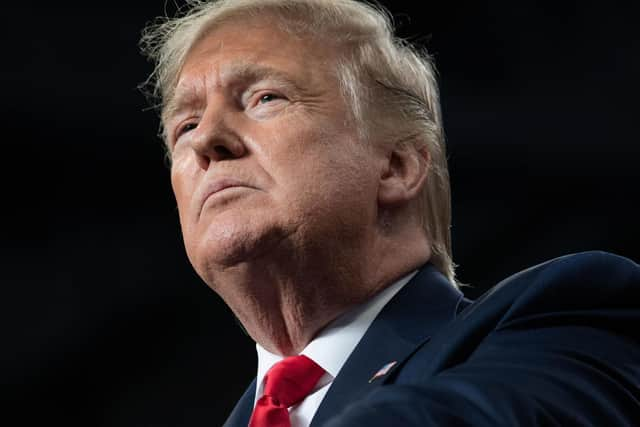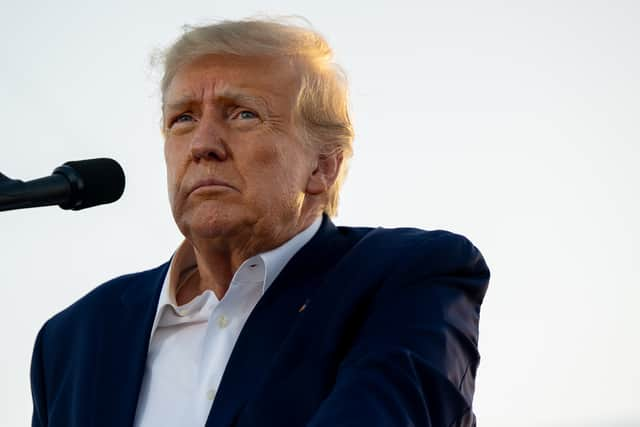Donald Trump indicted: What does indictment mean, will he go to jail & what is ‘hush money’?
This article contains affiliate links. We may earn a small commission on items purchased through this article, but that does not affect our editorial judgement.
and live on Freeview channel 276
Donald Trump will appear in court for an arraignment after a grand jury voted to indict the former US president. The incident - which allegedly saw Trump pay hush money to adult film star Stormy Daniels - is the first time in US history a former president has faced a criminal indictment.
In 2018, The Wall Street Journal reported that Donald Trump’s lawyer arranged a payment of $130,000 to pornographic film actress Stormy Daniels to prevent her from speaking about an affair she and Trump allegedly had. It is reported the ‘hush money’ payment was made prior to the 2016 United States presidential election.
Advertisement
Hide AdAdvertisement
Hide AdOn Thursday night, an announcement was made by a Grand Jury in the state of New York, that Donald Trump would face indictment charges. A spokesperson for District Attorney Alvin Bragg said: “This evening we contacted Mr. Trump’s attorney to coordinate his surrender… for arraignment on a Supreme Court indictment, which remains under seal.”
But what does this all mean? And could we see the former POTUS end up in prison? Here’s everything you need to know about Donald Trump’s indictment.
What is an indictment?
In the US legal system, an indictment refers to the formal document containing criminal charges an individual or group could face. It acts as an official notice from the prosecution team to the defendant.
An indictment also contains the location of the court in which the defendant could be tried and the name of all defendants involved. Evidence is normally presented behind-closed-doors to a grand jury, who are able to call on witnesses to testify if required.
Advertisement
Hide AdAdvertisement
Hide AdFollowing the hearing, the grand jury will then secretly vote to decide if the evidence is sufficient enough to bring charge to the defendant.
If the grand jury decides not to bring charges in the case then there will be ‘no indictment’. However, Donald Trump’s indictment has been returned and an arraignment hearing, which takes place before a judge, has reportedly been scheduled for Tuesday.


An arraignment hearing will give Trump the opportunity to plead guilty, not guilty or act upon a separate deal made by the prosecutors. If Trump pleads not guilty, the former POTUS will require a Defence Attorney and a trial date will be set by the judge.
Will Donald Trump go to jail?
While the prospect of Donald Trump being sentenced will rely on the outcome of the arraignment hearing, the businessman and politician will now be fingerprinted, photographed and arrested. Sources close to Trump have said he wants to be handcuffed when he appears in court, The Guardian reports.
Advertisement
Hide AdAdvertisement
Hide AdIt is likely to be a lengthy and complicated process if Donald Trump pleads not guilty at his arraignment hearing. Therefore, it is unclear at this given moment whether the politician will go to jail.


What is hush money?
Hush money is a term used to describe money that an individual pays someone to keep information secret. The arrangement can involve multiple parties and typically include a behind-closed-doors signing of a non-disclosure agreement.
Donald Trump’s indictment involves actress Stormy Daniels who reportedly received a $130,000 hush money payment to allegedly keep an affair secret before the 2016 presidential election. The former president’s then-attorney Michael Cohen pleaded guilty in Manhattan Federal Court to eight counts and was sentenced to a maximum of five years in prison.
During the trial, Cohen said he arranged payments to women at Trump’s direction, the New York Times reports.
Comment Guidelines
National World encourages reader discussion on our stories. User feedback, insights and back-and-forth exchanges add a rich layer of context to reporting. Please review our Community Guidelines before commenting.
